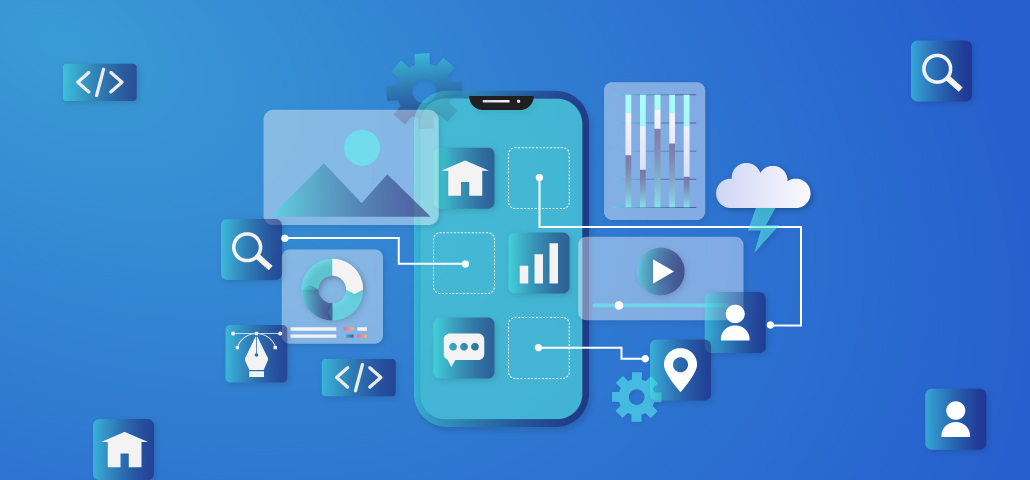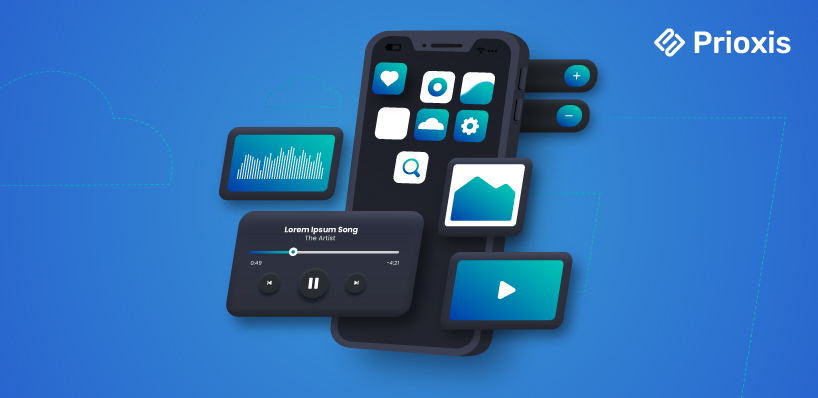
Table of Content
With nearly 4.83 million apps available across the Apple App Store and Google Play Store, it's clear that the app market is bustling for both iOS and Android users. Building a mobile app is a lot like opening a new business: you need to plan, understand your audience, build your product, and finally, launch it.
You’re in business, whether it's in services or retail, you've probably toyed with the idea of making your own app. A well-designed app that engages your customers can work wonders for you. But, let's be real, building a great app isn't exactly a walk in the park. It can seem overwhelming, but breaking it down into stages makes it much more manageable.
It's worth taking the time to get familiar with the ins and outs of app development before you jump into it.
Here’s a simplified guide through the mobile app development lifecycle to help you get from idea to app store without a hitch.

First things first: what’s your app all about? Think of it like outlining the purpose of a new tool or service. You need to nail down who it's for and what problem it’s going to solve.
If you're aiming to create a fitness app, your initial concept might focus on busy professionals looking for quick, effective workouts. You’d research what’s already out there, what your potential users complain about in other apps, and what they wish they had.
With your idea in place, now you need a plan. This step is all about laying out how to build your app. It’s like planning a trip where you decide the route, the stops along the way, and what you’ll need for the journey. You’ll think about the tools and technology that best fit your app, how long it will take to build, and what it’s going to cost.
Let’s say your fitness app needs features like video tutorials, progress tracking, and social sharing. During planning, you decide which features are a must-have for launch and which can be added later, helping you manage your budget and resources effectively.
Here’s where you get to visualize what your app will look like. Designers will sketch out the app’s pages and how everything links together—kind of like drafting a blueprint before building a house - it might not have the full functionality yet, but it gives you a look at the app’s layout and flow.
For our fitness app, you might prototype the sign-up process and a basic layout of the workout dashboard. This is also when you test your designs on potential users to get feedback. Is the app easy to navigate? Do the features make sense?
This phase is where the actual coding happens. Your development team takes the design and turns it into a functional app. They’ll write the code and build the app’s front end (what users interact with) and back end (the part that processes data and makes everything work). It’s like constructing a building: you need a solid foundation and structure to make everything stable and functional.
For the fitness app, our developers would program the video streaming feature and integrate it with user databases that track workout histories and achievements.
Just like you wouldn’t drive a new car without testing it first, you can’t launch your app without testing it thoroughly. This step is all about making sure everything works perfectly and that there are no bugs. You’ll check how the app performs under different conditions, make sure it’s easy to use, and confirm that it’s secure.
For the fitness app, check if videos stream smoothly, if the app crashes under heavy use, and if personal data is secure.
Deployment is the big day when your app goes live on the app stores. It’s like opening day for a new store. You’ve done the hard work of building everything, and now it’s time to let people in. You’ll need to keep an eye on how the app is doing, make sure it’s running smoothly, and be ready to fix any issues that users might report.
Launching your app isn’t the end of the road. Just like any tool or service, your app needs regular updates and application maintenance to keep it relevant and working well. You’ll listen to what users are saying, fix any issues, and maybe add new features. It’s all about keeping your app up-to-date and ensuring it continues to serve your users well.
Explore this end-to-end guide to developing an Android mobile application from scratch.
The time it takes to develop a mobile app isn't set in stone—it really depends on what you want your app to do. For a simple app with just the basics, you might be looking at about 4 to 6 months from start to finish. But if you're thinking about something more complex, with lots of features and advanced functionality, it could take anywhere from 6 to 12 months, sometimes even longer.
Here are some factors that influence how long it will take:
Developing a mobile application, whether for iOS or Android, is a detailed process involving many components. To make sure everything goes smoothly and you end up with a product you’re proud of, it’s important to work with an experienced iOS and android app development team that knows how to manage the app development lifecycle effectively. Following mobile development best practices is essential for a smoother app development process.
Understanding each step of the mobile app development lifecycle can make the whole process seem a lot less stressful. Knowing what’s ahead makes it easier to manage and navigate. With this guide, you’ll be better prepared to tackle each phase, keeping your project on track and heading towards a successful launch.
Ready to get started on your app? Just take it one step at a time, and you’ll find that building a mobile app is an exciting and rewarding adventure. Remember, the best apps evolve with their users' needs, so stay receptive to feedback and be ready to adapt. That's how you keep your app—and your business—growing.
At Prioxis, we pride ourselves on offering stellar service to companies developing apps for both iOS and Android. Our team brings years of experience to the table, successfully developing, launching, and maintaining apps for a variety of businesses, big and small. We take care of the entire app development process so you can concentrate on your core business, ensuring the app works for you without consuming your valuable time and attention. If you're ready to push your business forward with a custom app, reach out to us today. You’ll be in good hands, with a top-notch team dedicated to making your app a success.
Get in touch